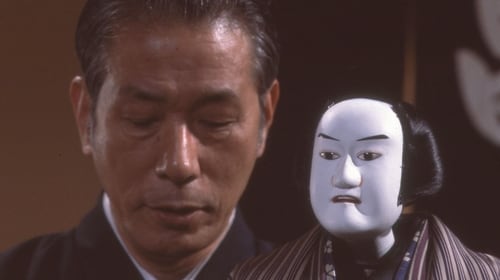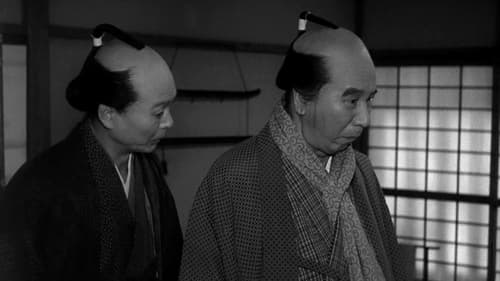
Original Story
Starting with director Gosha Hideo's version in 1992, the puppet theater of Chikamatsu Monzaemon has been made into a film on countless occasions. The actor Sakagami Shinobu wrote and directed this version. This new interpretation focuses on a woman who played a minor role in the original version, and features a bold performance from former pin-up model Fujikawa Nozomi. Yohee (Yasuda Shingo), son and heir of the store Kawachiya, runs up huge debts due to his obsession with the prostitute Okiku (Fujikawa). Told by her husband Chizaemon, Okichi (Yamada Kinuwo) goes to condemn Yohee. On her way back home, Okiku laughs and mocks her, which Okichi finds sexually exciting.

Theatre Play
The indolent son of an oil vendor becomes a regular customer of a prostitute, racks up a mountain of debt, and is disowned by his parents.

Writer
The tragic story of Gonza, a handsome ladies man, set in the Tokagawa Period, a time in which appearences are very important. Gonza competes with Bannojo for the honor to perform the tea ceremony to celebrate the birth of an heir to the lord of their clan. To see the sacred tea scrolls Gonza promises to marry the daughter of the family which possesses them, even though he is unofficially engaged to another. When studying the scrolls with Osai, the mother of the house, Bannajo sneaks into the house and steals their obis and runs through the town proclaiming the two as adulterers.

Writer
A bunraku puppet drama of the courtesan Ohatsu and her lover, Tokubei, a soy-sauce merchant whose fortunes have gone awry through the perfidy of a trusted associate. For Tokubei, suicide is the only honorable act left; for Ohatsu, it is the only emotionally viable one.

Writer
An adaptation of “The Courier for Hell” (“Meido no Hikyaku”) by Chikamatsu Monzaemon (1653-1725).

Story
Suicide has long been used as a form of social protest in Japan. In this film, set in 1703, samurai culture is being transformed by the emergence of a new merchant class. Elements of the social contract are beginning to unravel, and some unscrupulous people took undue advantage of these changes before the social order was re-created. In this story, a rich merchant gives his clerk an I.O.U. instead of wages. When the impoverished clerk presents the paper to the merchant at the agreed upon time asking for payment, the man flies into a rage and pretends he never wrote it and claims the clerk is trying to defraud him. Then he sets his henchmen on the clerk to administer a beating.

Story
Successful and married with children, paper-mill owner Jihei knows better than to contradict the strict social and moral codes of 18th-century Japan. But when he meets the lovely courtesan Koharu, he becomes a man obsessed. Koharu returns his love, even foregoing other customers while Jihei schemes to somehow buy her freedom. His efforts yield ruinous consequences for his business and his family life, and Koharu is meanwhile purchased by another client.

Novel
The adopted son of an Osaka courier falls in love with a prostitute and, discovering that she is about to be purchased by a client, steals money from his employer to redeem her. Hunted criminals, the two young lovers take flight to Yamato, but, as in Chikamatsu's other domestic tragedies of love and duty (known as sewamono), they must be pursued and their passion destroyed by death. Favourite Uchida themes, such as the indenturing of a prostitute (cf. YOSHIWARA; A BLOODY SPEAR AT MT. FUJI), and his characteristic emphasis on performance and theatrical artifice re-emerge here; but the daring device of having Chikamatsu appear as a character - not unlike having Shakespeare interpolated into a film adaptation of one of his plays - is just one of many surprises this remarkable film holds. “Extraordinary” (Donald Richie).

Original Story
Following a yearlong attendance upon his shogun in Edo, samurai Hikokuro makes a long-awaited return to his home and doting wife, Dane. Initially greeted by the effusive welcome of his family, spiteful whispers also reach his ear about an adulterous affair carried on, in his long absence, between his wife and a famous drummer. With Hikokuro’s honor imperiled by rumor, his family insists on a formal investigation into the veracity of the gossip. Through the combined testimony of many witnesses, a tale unwinds around the visits of a traveling musician hired to tutor the family heir, the spurned attentions of the man who started the rumor, and the ultimate truth behind the accusations. The conclusion of events prove as much an indictment of bushidō as it is of the reluctant parties involved. Adapted from a 1706 play by Chikamatsu Monzaemon and based on a true case.

Story
In 17th century Kyoto, Osan is married to Ishun, a wealthy miserly scroll-maker. When Osan is falsely accused of having an affair with the best worker, Mohei, the pair flee the city and declare their love for each other. Ishun orders his men to find them, and separate them to avoid public humiliation.









